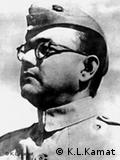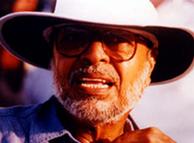The residents of Marquardt, a sleepy town near Potsdam west of the German capital, were rubbing their eyes in disbelief last week.
An Indian film crew had taken over the sprawling verdant grounds of their picturesque neo-baroque castle located on the banks of a lake. Vans full of technical equipment and costumes were parked in the driveway as technicians, actors and extra hands -- both German and Indian -- hurried around barking instructions and calling out to each other in German, English and a handful of Indian languages.
The fuss wasn’t about the latest glitzy song-and-dance movie churned out by India’s mainstream multibillion dollar Bombay-based film industry known as Bollywood. Rather it was the shooting of a weighty historical epic tracing the last five years in the life of Subhas Chandra Bose or Netaji (the leader), who set up the Indian National Army in exile to fight against British colonial rule during World War II.
Titled "Netaji: The Last Hero," the film directed by 70-year-old Indian cinema legend Shyam Benegal, throws light on a little-known, almost strange, chapter of Indo-German history. The shooting stint in Germany focuses on Bose’s two-year stay in Berlin in the early 1940s and his single meeting with Hitler when he requested the Führer’s help in the Indian independence struggle against the British Empire.
"It’s the story of a great adventure, of a flamboyant person who was obviously a romantic as well as a strategist, because who would think of leaving the country and trying to raise an army to fight for Indian independence from outside of India?" director Benegal, who is considered the pioneer of new wave Indian cinema, told Deutsche Welle.
The enemy of my enemy
Bose (photo), a revolutionary lawyer and leader of the Congress Party in India who stood in direct confrontation with Gandhi’s passive and nonviolent resistance methods against the British, escaped from India in 1941 following British imprisonment and made his way to Berlin, after failing to get himself smuggled to the Soviet Union.
Bose’s plan was to get Hitler’s help to stage a revolution in India that would distract British forces from the war against Germany under the motto "the enemy of my enemy is my friend." He calculated that in the process, Britain would lose the war against the militarily superior Germany and as a consequence, lose India as well.
"However things didn’t quite turn out that way," Benegal said. Though the Germans provided financial support for Bose to broadcast radio propaganda messages to India, it wasn’t until more than a year later that Hitler, allegedly impressed with Bose’s cause, agreed to hear him out.
But the much-awaited meeting on May 27, 1942, ended in disappointment for the Indian revolutionary. "In that meeting, he [Bose] asked Hitler to cut out passages in "Mein Kampf" dealing with Asians and [Hitler said] that it was better for India to remain under British domination. Hitler refused to help him," Benegal explained.
German history professor Johannes Voigt, who authored a book on India during World War II, said it wasn’t just Hitler’s strong theories of race that stopped him from helping Bose, whom he considered racially-inferior. "He was convinced that colonial rule needed to be upheld if Europe’s dominance was to continue. Besides India was too far away."
Indian POWS and a submarine escape
Benegal’s three-hour, four-million-euro epic also dwells on what is considered Bose’s biggest accomplishment in Germany – the raising of a 3,000-strong Indian Legion force, made up of Indian POWS captured by the Germans in the course of fighting in North Africa. The Indian community in Berlin was pressed into service to play the role of the troops.
Bose envisioned the force spearheading an attack on the British while the Germans swung through the Soviet Union and the Middle East to India. But that plan fell apart, too, when the Germans were defeated at Stalingrad in early 1943. "Bose soon realized it was pointless for him to remain [in Germany] much longer," said Benegal.
The Germans, however, provided Bose with the means to get out of Germany to Japan, where he believed he stood a better chance of organizing a large-scale Indian army. In February 1943, the Indian exile leader boarded the submarine U180 at the Kiel harbor on the Baltic coast, and traveled to the coast of Mozambique, from where he transferred to a Japanese submarine.
In the movie, the escape from Germany and the spectacular journey are filmed on site in Kiel’s harbor (photo).
After Bose’s departure, the Indian Legion Force in Germany came to a sad end. "Their fate remains largely unknown. They were absorbed into the regular German army and sent to fight in Normandy," said Professor Voigt. "After the war, some came back through southern Germany, many perished and some were sent back to India after the war."
A gravestone inscription, "five unknown dead, 4.5.1945" in Immenstadt in Swabia, southern Germany, is believed to be one of the last remaining traces of the Indian Legion in Germany today.
Bose himself finally raised an army in Burma and led the soldiers into India to fight the British, but he died in a plane crash in 1945 and never lived to see Indian independence.
A touch of romance
The memory of Subhas Chandra Bose’s mission in Germany isn’t just consigned to history books and archives. Bose married Austrian Emilie Schenkl in the 1930s during his first visit to Germany. The couple moved to Berlin where they had a daughter, Anita. Today Bose’s daughter, Anita Pfaff, is an economics professor at Augsburg University in southern Germany.
Director Benegal’s shooting at the Marquardt castle involves romantic scenes with Bose and his wife (played by German actress Anna Prüstel) strolling through the picturesque grounds, a mellifluous Hindi song playing in the background. Berlin actress Prüstel said it was amazing how few people in Germany were aware of Bose’s visit to Germany. "This whole cooperation with Hitler, Bose’s go-it-alone attitude is simply so unbelievable. I find it hard to understand how nobody ever used this material and got it out in the public," she said.
Scheduled to release in January next year, both in Hindi and English, Benegal’s action-packed film is expected to raise awareness of the revolutionary and his cause. The veteran director (photo, below), who has also made a film on Gandhi’s life, said he wants "Netaji: The Last Hero" to set the record straight on one of the most controversial political figures in pre-independent India.
"Among all the anti-colonial leaders in Asia, he [Bose] is the only one the British continue to claim was a traitor," he said. "But Bose’s idealism was free of any kind of cynicism. In that sense he had a simple, straightforward goal – to free India. That makes him a hero figure to me."










